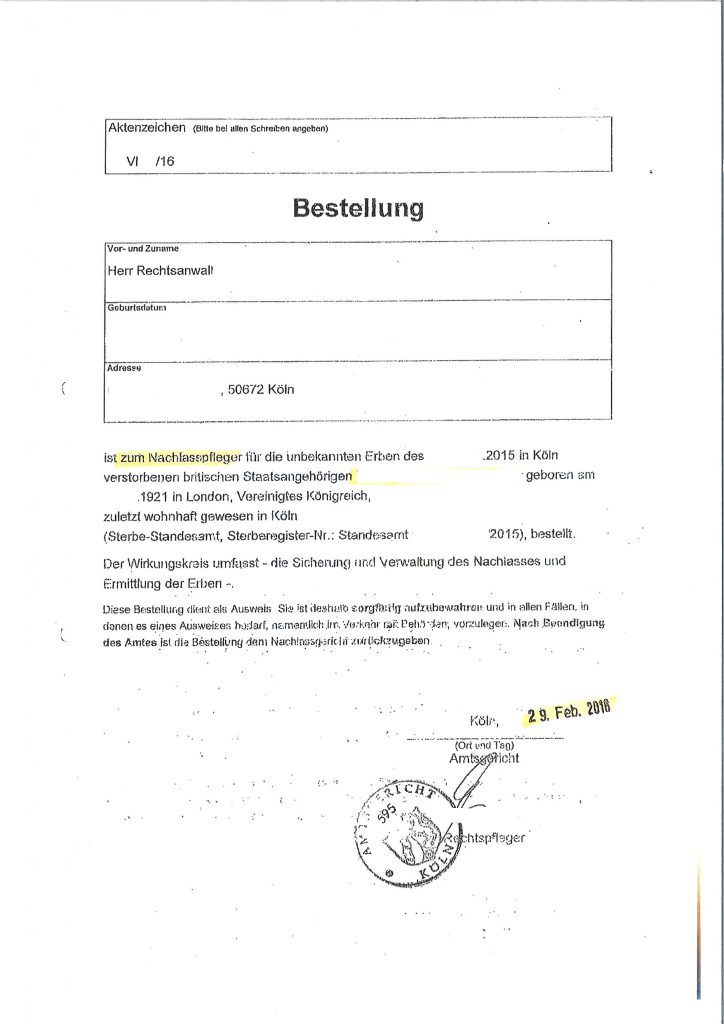
What to do in Germany when an Heir (Beneficiary) cannot be found
In Germany, due to the principle of universal succession (which is governed by §§ 1922, 1937 BGB of the German Civil Code), it is the heir´s duty to look after the estate. Under German inheritance law, there is no personal representative to take possession of the estate. The German Probate Court (“Nachlassgericht”) will also not interfere with the administration of the estate. The Court will only act if someone applies for a German grant to be issued. Then it will assess whether the person(s) applying for the grant are the rightful heirs. While, in theory, the German probate court is obligated to actively research the legal heirs (Amtsermittlungsgrundsatz), in practice the court will merely demand the probate applicant to submit the relevant information and necessary documents (i.e. death certificates, birth certificates, marriage and divorce certificates).
How to resolve the problem of unknown relatives in German Probate Applications
Problems often arise when the deceased died intestate and had no close relatives who are willing and able to apply for an official certificate of inheritance (“Erbschein”) from the Probate Court and to take possession of the estate. In quite a large number of inheritance cases, distant relatives often have no contact with or don´t even know about their kinship and the potential heirship that accrues to them. The grandfather or great-grandfather generation often died or went missing in the war, persons registers were also sometimes destroyed due to the war. In these cases, it is very hard to demonstrate to the German probate court who the closest living relatives of the decendent are. Researching these relatives sometimes takes years during which time it is unclear who is entitled to the estate.
Who protects the German estate while the next of kin are being investigated?
If this happens, according to section 1962 BGB, the German Probate Court has a duty of care to safe-keep the estate and initiate an official investigation of heir(s). According to section 1960 para. 2 BGB, there are various legal protective measures which the court can take, such as affixing of seals, payment of estate monies into court for safekeeping, deposition of securities or imposing a catalogue of the estate. What needs to be done in a specific case is up to the Probate Court´s discretion. In practice, the route most often taken is for the court to appoint an official curator for the estate, section 1960 para. 2 BGB (“Nachlasspfleger”). Read more on “Nachlasspflegschaft” in cases where the estate may be indebted in this post.
How does the Court appointed German Curator proceed?
The curator, who is usually a lawyer specialised in matters of succession law, is appointed by the competent German probate registry (Nachlassgericht) according to §§ 1962, 1789 BGB. This is what a German court order appointing an official estate curator looks like:

German Court Order Appointing an Estate Curator (Bestellung eines Nachlasspflegers für unbekannte Erben)
The curator is instructed (and authorised) by the German probate registrar to take possession of the entire (German part of the) estate in order to safe-keep it on behalf of the (currently still unknown) members of the community of heirs. His duties are listed in the German Civil Code in sections 1806, 1812 ff. BGB.
What does “Ermittlung der Erben” mean?
Furthermore, the curator has the obligation to start an investigation to identify and contact all co-heirs according to the order of succession which is explained in this post: German Intestacy Rules.
As a first step, the curator will draw up a “family tree” chart in order to get an overview about the kinship of the deceased. If there are no close relatives, it may get difficult to identify the true heirs. Distant relatives, who potentially never knew the deceased may have moved to foreign countries or they may not respond because they think the curator is a fraudster. A curator must therefore be skilled in “detective work”.
Once the curator has been able to ascertain the next of kin who – if more than one person – form the community of heirs (Erbengemeinschaft), each one of them is entitled to apply for an heir´s certificate (§ 2353 BGB) at the Probate Court, which then certifies their respective share in the estate of the deceased. The Probate Court will identify the kinship by birth, marriage and death certificates. When heirs are citizens of another country, the Probate Court will, at least, require legalised copies plus certified translations of the same. It is the duty of the curator to take care about the regulatory matters, to contact family members in Germany and abroad and to collect all necessary documents for the probate application.
Once the certificate of inheritance is issued, according to § 2365 BGB, there is a legal presumption of its veracity, i.e. unless challenged by anyone, the beneficiaries mentioned in the vertificate are able and permitted to administer and distribute the estate among themselves.
For more information on German-British probate matters and international will preparation see the below posts by the international succession law experts of Graf & Partners LLP:
- Most Germans die without a Will (German Intestacy Rules)
- Formal Requirements to set up a valid Will in England, Scotland and Germany: What are the Differences?
- The Perils of German IHT and Gift Tax
- Careful with Deed of Variation if Estate comprises Foreign Assets
- Basics of German Inheritance and Succession Law
- Executors and Trustees in German Inheritance Law
- How to apply for a German Grant of Probate
- The Infamous German Community of Heirs – And how to avoid it
- Germans Heirs are Personally Liable for Debts of the Deceased
- International Wills and Estate Planning for British-German Families
- Prove German Wills for English Probate
- Disputed Wills and Contentious Probate in Germany
- Disinherit your no-good children? Not so easy in Germany
- Don’t be afraid of Clients with Foreign Assets!
- Can foreign Taxes be set off against UK Inheritance Tax?
Or simply click on the “German Probate” section in the right column of this blog.
The law firm Graf & Partners and its German-English litigation department GP Chambers was established in 2003 and has many years of experience with British-German and US-German probate matters, including the representation of clients in contentious probate matters. We are experts ininternational succession matters, probate and inheritance law. If you wish us to advise or represent you in a German or cross border inheritance case please contact German solicitor Bernhard Schmeilzl, LL.M. (Leicester) at +49 941 463 7070.
